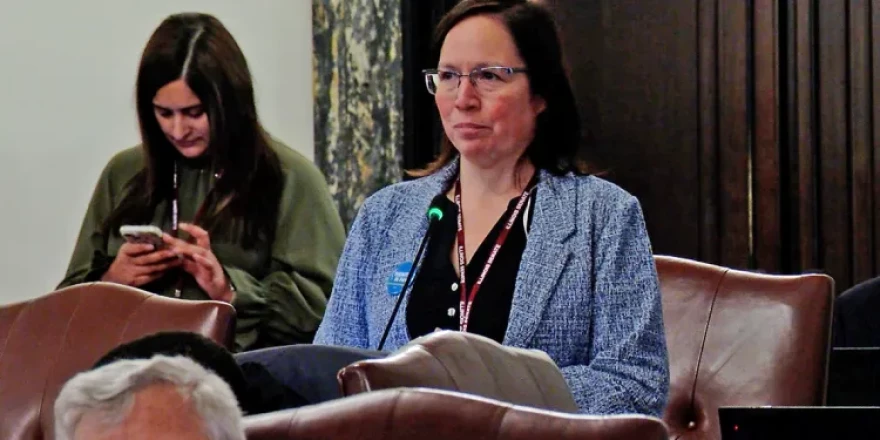A long-awaited bill to stop Illinois organizations from paying subminimum wage to workers with disabilities will soon head to Gov. JB Pritzker’s desk after being approved by the Senate on Thursday.
The Senate took a bipartisan 43-11 vote to pass the legislation that supporters dub the “Dignity in Pay Act.”
“It is time to treat people with developmental disabilities the same and have them be paid what they’re worth, which is what we pay everybody else,” bill sponsor Sen. Cristina Castro, D-Elgin, told a Senate committee on Wednesday.
House Bill 793, if signed by the governor, would prohibit businesses and other residential facilities in Illinois from claiming an exemption allowing them to pay workers with disabilities less than minimum wage.
The exemption is known as a 14(c) certificate, named after the section of the Fair Labor Standards Act of 1938 permitting lower wages. Certificate holders are allowed to pay a “commensurate wage” based on the worker’s individual productivity in proportion to the wage and productivity of workers who do not have disabilities but are performing the same or a similar task.
Under the bill, Illinois has through 2029 to abolish the subminimum wage for workers with disabilities.
The bill was previously approved on a bipartisan 78-30 vote in the House in May following lengthy negotiations. It would create a transition grant program designed to provide financial support for organizations to continue employing people with disabilities while paying them at least the state minimum wage. It also establishes a task force to oversee the transition in the coming years.
Read more: Illinois could be 19th state to phase out subminimum wage for disabled workers
Pritzker issued a statement on Thursday in support of the bill, which would make Illinois the 19th state to end 14(c) participation.
“The Dignity in Pay Act is an unprecedented, crucial leap forward to a future where all individuals, regardless of ability, can maximize their talents and contributions to our workforce—and earn a fair wage,” he said in the statement.
Erin Compton, who has an intellectual disability, told a Senate committee Wednesday she gets paid minimum wage to work as a greeter for the Chicago Cubs.
“Some people say that having a job isn’t me because I am not smart enough or good enough to work,” Compton said. “But I was given opportunities to work in the community.”
Illinois has 61 programs currently receiving a federal exemption, according to the U.S. Department of Labor — down from 112 in 2018, according to Ryan Croke, a first assistant deputy governor.
It was a controversial road to passage, however, with proponents facing opposition from some of the state’s largest operators of “sheltered work” programs, which employ people with disabilities to perform work for less than minimum wage, often doing work that is outsourced from other businesses. Those organizations, and people with family members participating in them, argued the bill will force those programs to end at places that can’t afford to pay minimum wage for potentially low-productivity work.
Sen. Jil Tracy, R-Quincy, said during a committee hearing Wednesday her brother, who has a disability, works for a business shredding paper. She voted against the bill.
“How in the world are they going to be able to pay minimum wage is my question? What happens if that shredding paper employment goes away?” she asked of the subminimum wage work.
Hugo Saltijeral from the Valley Sheltered Workshop in Batavia said the bill will push families to send their loved ones with disabilities to unaffordable institutions that can afford to pay people with disabilities at least minimum wage.
“Fourteen-C programs are the most affordable and flexible options available to families,” Saltijeral said.
But Castro said Saltijeral’s argument reinforced why Illinois should end 14(c) exemptions after he explained how his organization pays disabled workers less than what the rate for the same job would be at the company they contract with.
“You’re saying its OK to pay these folks less. ‘I’ll take a cut to employ my people,’ versus, ‘hey, lets work with different agencies, let’s look at different state programs,’” Castro said in committee. “Partner with those programs because there’s a lot of different programs that could help you move from this model to be successful.”
Many state lawmakers said they shared concerns similar to those Saltijeral relayed. It’s one reason why the parties agreed to create a task force to oversee the wind down of 14(c) exemptions and created a five-year runway.
“We have to somehow accommodate those that aren’t going to be able to be at productivity levels to allow a business to contract with, say, a private provider like Valley house shelter to keep these workers employed,” Tracy said Thursday during floor debate.
Lawmakers who voted against the bill praised its intentions, but said their concerns run too deep.
“I can’t vote for a bill no matter how well intentioned it is that I know is going to send pink slips to people in my area,” Sen. Chapin Rose, R-Mahomet, said during floor debate.
Eighteen states and Chicago have ended exemptions with few negative effects on programs for people with disabilities, Croke said.
“In those jurisdictions, the sky did not fall, people with disabilities and the providers who serve them have new doors open to increased federal funding, they benefit from a focus on meaningful job training,” Croke said.
Capitol News Illinois is a nonprofit, nonpartisan news service that distributes state government coverage to hundreds of news outlets statewide. It is funded primarily by the Illinois Press Foundation and the Robert R. McCormick Foundation.
This article first appeared on Capitol News Illinois and is republished here under a Creative Commons license.



